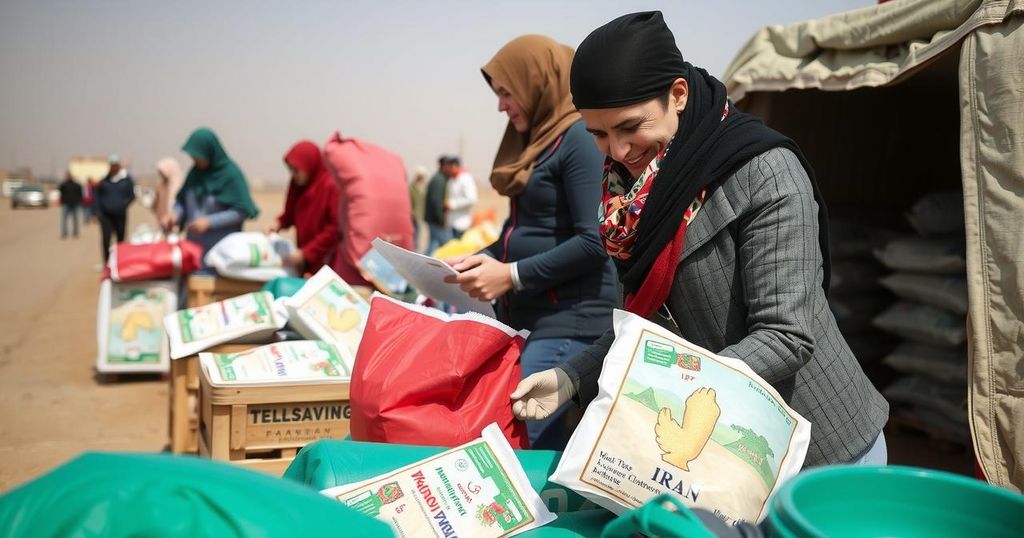The World Food Program (WFP) reaffirms its commitment to support Iran, one of the largest refugee host countries, amid increasing challenges from a rising influx of Afghan migrants. Iranian officials stress the need for enhanced regional and international cooperation to effectively address humanitarian crises. With millions of refugees residing in Iran, concerns about funding and resources for education and healthcare remain paramount, prompting possible revisions to immigration policies if international support fails to materialize.
TEHRAN – Maysaa Alghribawy, the newly appointed representative of the World Food Program (WFP) in Iran, has affirmed the organization’s dedication to supporting Iran, which is one of the largest hosts of refugees globally. During her initial meeting with Iranian Foreign Minister Abbas Araghchi, Alghribawy underscored the urgent need for enhanced collaboration to effectively address the challenges faced by the WFP in the region, as reported by the Foreign Ministry’s website. Araghchi, in response, emphasized that resolving the humanitarian crises, particularly concerning refugees and migrants in West Asia, necessitates both regional and international cooperative efforts.
According to Nader Yar-Ahmadi, head of Iran’s National Organization for Migration, approximately 4,000 authorized Afghan nationals cross into Iran daily, contributing to an estimated total of six million Afghans residing in the country, both documented and undocumented. The influx of migrants often results from various regional crises that induce significant social changes. Yar-Ahmadi noted that foreign nationals are required to possess a minimum deposit of $100,000 for a one-year residency permit, to aid in the proper documentation and organization of incoming individuals.
Yar-Ahmadi also highlighted the possibility of Iran revising its refugee policies should the international community fail to equitably share the responsibility for hosting refugees. He expressed concerns during a discussion with Filippo Grandi, the UN High Commissioner for Refugees, during the 75th Annual Session of the UNHCR in Geneva. Yar-Ahmadi remarked that the severe pressures on Iran’s educational, economic, and health infrastructure due to the rising number of foreign nationals, coupled with the UNHCR’s limited budget allocations, has exacerbated the situation for refugees in Iran.
He further articulated that less than one percent of the costs associated with hosting refugees have been covered, making the prospect of accommodating additional refugees unfeasible and advocating for their return to their countries of origin. Despite previous commitments made during a prior visit to increase health insurance coverage for vulnerable refugees, the actual number of insured individuals has unfortunately diminished from 120,000 to 95,000.
In light of the increasing strains on the educational system due to Afghan nationals’ enrollment in schools, Yar-Ahmadi insisted that the UNHCR must mobilize resources to cover educational expenses, including the establishment and renovation of educational facilities and the costs of hiring teachers. He noted that while 25,000 classrooms are needed for foreign students, only 21 schools have been constructed with the UNHCR’s support since 2021, indicating a significant shortfall.
The article discusses the ongoing humanitarian challenges faced by Iran, a significant host country for refugees, particularly from Afghanistan. Maysaa Alghribawy’s appointment as the WFP representative highlights the organization’s increased focus on addressing food security and collaboration within Iran. The country is currently accommodating millions of Afghan refugees, partly due to crises in their homeland. The government’s efforts to manage this influx are complicated by insufficient international support and funding, prompting a potential reassessment of immigration policies if conditions do not improve. Iranian officials underscore the urgent need for international cooperation to effectively handle the situation, particularly in education and healthcare sectors for migrant populations.
In conclusion, the WFP’s commitment to supporting Iran amid its extensive refugee crisis underscores the vital importance of international cooperation in addressing humanitarian issues. With thousands of Afghans entering Iran daily and the overall strain on the country’s resources, Iranian officials call for shared responsibility from the international community. The challenges posed by the rising number of refugees necessitate urgent action, particularly in educational and healthcare support, to alleviate the pressures on Iran’s infrastructure and to provide assistance to vulnerable populations.
Original Source: www.tehrantimes.com






